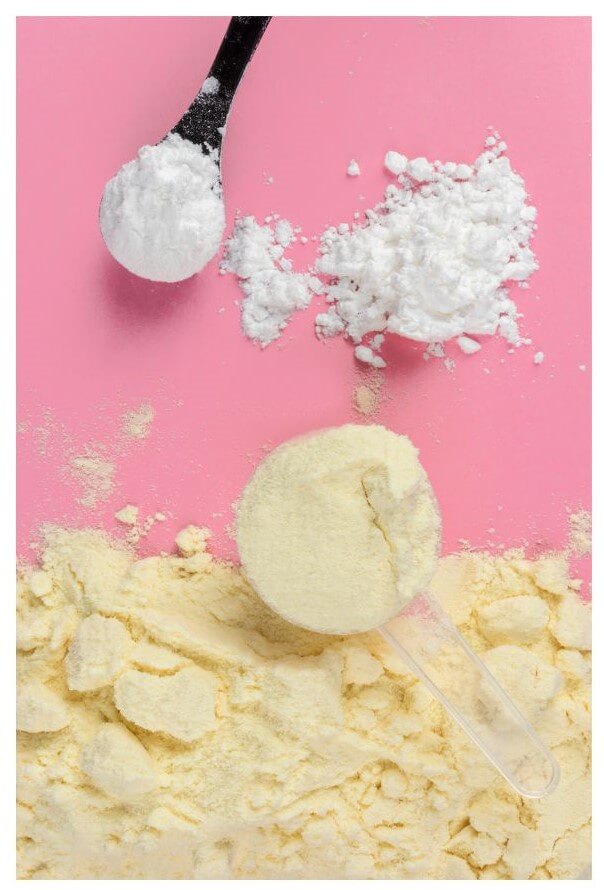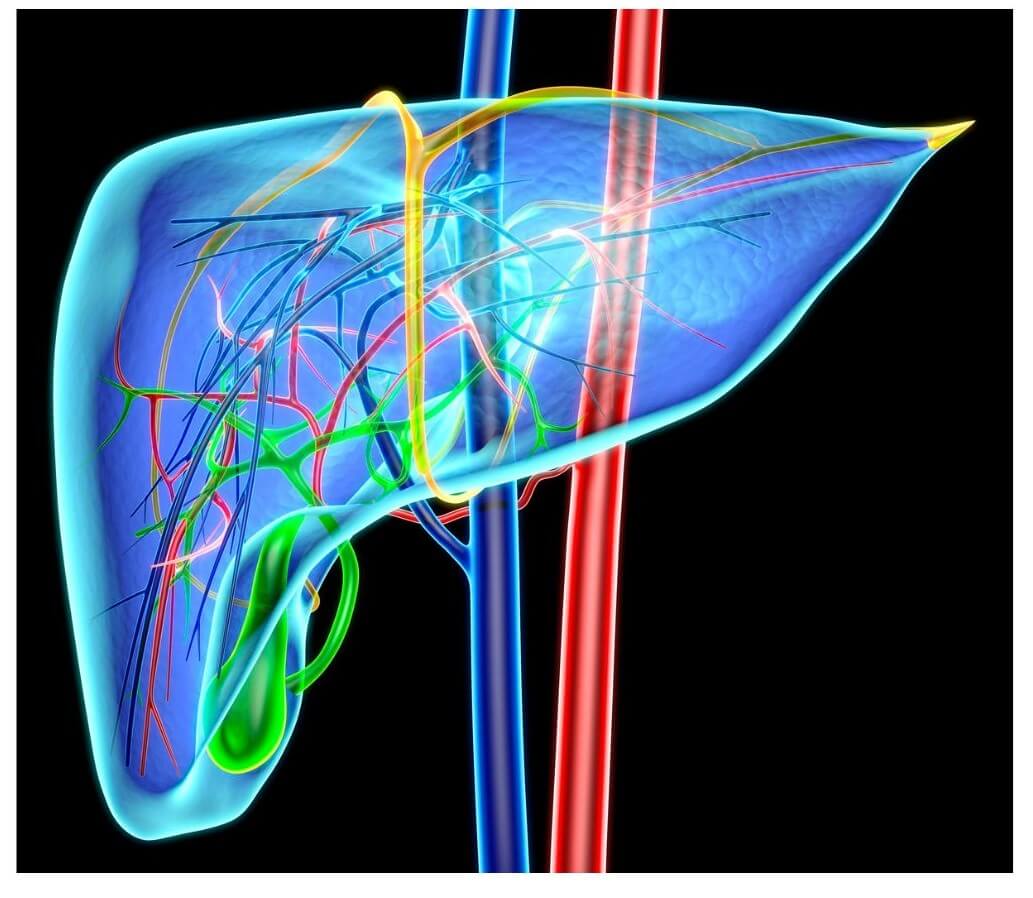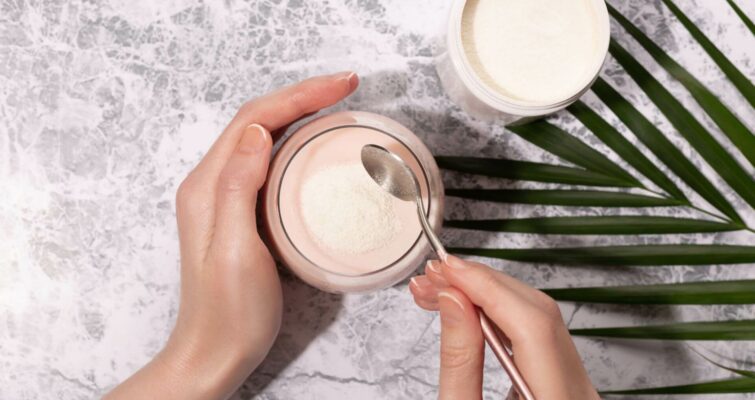Taking care of your gut health doesn’t have to be complicated—even considering everyone’s unique needs based on lifestyle, dietary preferences, and inherent biological differences. Keeping up with the basics starts with a healthy, nutrient-dense diet, then adding in supportive, gut-healthy compounds from probiotics, prebiotics, fibers, antioxidants, fatty acids, and amino acids.
For the ultimate in digestive help, there’s one amino acid that gets an A+ for gut healthy benefits.

What is L-Glutamine?
L-glutamine is an amino acid, which are the individual building blocks that make up all proteins. This particular amino acid is well-known for supporting the special cells that line your digestive tract.
From a broader standpoint, proteins are an essential nutrient and they’re the backbone of many cellular functions, muscle maintenance, and even everyday gut health. Glutamine, in particular, is involved in collagen production (the same collagen that’s key for youthful, supple skin) as well as providing fuel for the cells in our gut.
L-glutamine is simply the form of the amino acid that we find most often in supplements.
Gut health and healing leaky gut
One of the standout benefits of L-glutamine is its remarkable impact on gut health. The intestinal lining is a vital barrier that prevents harmful substances from entering the bloodstream. L-glutamine acts as a potent fuel source for the cells of the gut lining, supporting their growth and maintenance (1). It also plays a pivotal role in sealing gaps in the intestinal barrier, which can help address “leaky gut” – a condition linked to various health issues.
One review published in the International Journal of Molecular Sciences found that L-glutamine supplementation helped maintain the integrity of the gut barrier in patients with intestinal diseases, such as IBD, underscoring its potential to support gut health (2).
Related: 10 Warning Signs of An Unhealthy Gut

Aside from supporting gut health, L-glutamine can have many other health benefits too.
Cognitive clarity and brain health
Beyond its impact on the gut, L-glutamine has intriguing effects on brain health. It’s a precursor to glutamate, a neurotransmitter essential for brain function. Adequate L-glutamine levels support cognitive function, memory, and overall mental clarity. Plus, a healthy gut is crucial for a healthy mind.
L-glutamine supplements can help to improve cognitive function in people with mild cognitive impairment (3).
Read more: Is Your Gut Messed Up? Why It Could Spell Trouble for Your Brain
Muscle recovery and repair
For those engaged in physical activity, L-glutamine is a valuable ally in muscle recovery and repair. During intense exercise, glutamine levels can become depleted, leading to fatigue and compromised immune function. Supplementing with L-glutamine aids in muscle tissue repair, reducing muscle soreness and accelerating recovery (4).
Glutamine is also the most abundant free amino acid in the muscles, and in the rest of the body, which means it plays crucial roles in muscle maintenance and performance (1).
Related: How Much Protein Do You Really Need?
Regulating insulin response & balancing blood sugar
L-glutamine also influences insulin response, a critical factor in blood sugar regulation. It supports insulin sensitivity, helping cells effectively utilize glucose for energy (5). By promoting balanced blood sugar levels, L-glutamine can play a role in metabolic health.
If your body doesn’t respond to insulin properly, it can lead to weight gain and other health issues. Studies have shown that L-glutamine supplements can increase insulin sensitivity, which may play a role in helping to prevent insulin resistance and type 2 diabetes (6).
Nurturing the body’s detoxifier

The liver, our body’s primary detoxification organ, benefits from L-glutamine’s presence. It supports liver function by aiding in the detoxification process. L-glutamine assists in the synthesis of glutathione, a potent antioxidant that helps neutralize harmful compounds in the body (7).
Your liver can become overloaded with a high toxic load as a result of an unhealthy lifestyle, genetics, or certain environmental exposures. L-glutamine can help support liver function by increasing the production of glutathione, an antioxidant that helps to remove toxins from your body.
Related: Home Detox Guide: How to Minimize Your In-Home Toxin Exposures
5 Tips to make L-Glutamine into your daily routine
Now that we’ve explored the impressive array of benefits L-glutamine offers, how can you make it a part of your daily routine?
Dietary Sources: L-glutamine is naturally present in many protein-rich foods, including meats, fish, dairy products, beans, and legumes. Incorporating these foods into your diet can help increase your L-glutamine intake.
Supplementation: L-glutamine is most often taken in powder form, and mixes easily with any liquid. To support gut health, dosages range from 500 mg per day to up to 5 grams or more. It varies based on individual needs and health goals.
Post-Workout Support: Consider consuming L-glutamine after intense workouts to support muscle recovery and reduce exercise-induced fatigue.
Gut Healing Protocols: If you’re addressing gut health concerns, incorporating L-glutamine can be a valuable component of your healing regimen.
Balanced Approach: As with any supplement, moderation is key. Incorporate L-glutamine as part of a balanced and varied diet.
Using L-Glutamine Safely
L-glutamine has a lot of impressive health benefits that make it worth considering as a dietary supplement. Whether you’re looking to improve your gut health, brain function, or general wellness, L-glutamine is a useful addition to help you achieve your goals.
As with any supplement or medication, it’s important to talk to your healthcare provider if you have concerns about whether or not L-glutamine is right for you, and what dosage you should take. But overall, L-glutamine is a safe, natural, and effective way to support your body’s general health and function.
Resources
- https://www.ncbi.nlm.nih.gov/pmc/articles/PMC6834172/
- https://pubmed.ncbi.nlm.nih.gov/28498331/
- https://www.ncbi.nlm.nih.gov/pmc/articles/PMC7230523/
- https://www.ncbi.nlm.nih.gov/pmc/articles/PMC6520936/
- https://pubmed.ncbi.nlm.nih.gov/17713407/
- https://www.ncbi.nlm.nih.gov/pmc/articles/PMC3228321/
- https://pubmed.ncbi.nlm.nih.gov/11172416/


